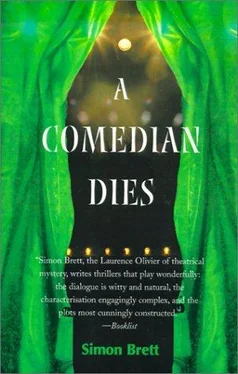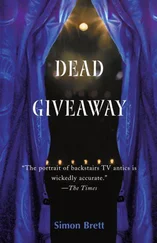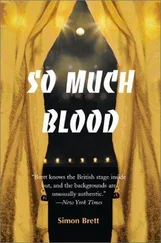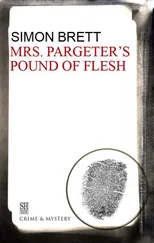Simon Brett - A Comedian Dies
Здесь есть возможность читать онлайн «Simon Brett - A Comedian Dies» весь текст электронной книги совершенно бесплатно (целиком полную версию без сокращений). В некоторых случаях можно слушать аудио, скачать через торрент в формате fb2 и присутствует краткое содержание. Жанр: Классический детектив, на английском языке. Описание произведения, (предисловие) а так же отзывы посетителей доступны на портале библиотеки ЛибКат.
- Название:A Comedian Dies
- Автор:
- Жанр:
- Год:неизвестен
- ISBN:нет данных
- Рейтинг книги:5 / 5. Голосов: 1
-
Избранное:Добавить в избранное
- Отзывы:
-
Ваша оценка:
- 100
- 1
- 2
- 3
- 4
- 5
A Comedian Dies: краткое содержание, описание и аннотация
Предлагаем к чтению аннотацию, описание, краткое содержание или предисловие (зависит от того, что написал сам автор книги «A Comedian Dies»). Если вы не нашли необходимую информацию о книге — напишите в комментариях, мы постараемся отыскать её.
A Comedian Dies — читать онлайн бесплатно полную книгу (весь текст) целиком
Ниже представлен текст книги, разбитый по страницам. Система сохранения места последней прочитанной страницы, позволяет с удобством читать онлайн бесплатно книгу «A Comedian Dies», без необходимости каждый раз заново искать на чём Вы остановились. Поставьте закладку, и сможете в любой момент перейти на страницу, на которой закончили чтение.
Интервал:
Закладка:
The increase in the number of worried-looking men with head-phones and the lumbering approach of cameras and lights indicated that the televised part of the proceedings was about to start. Rather than missing Paul Royce in the confusion of everyone’s departure, Charles hurried across to the BBC table. ‘Paul, I wonder, could we have a quick word after the ceremony? Something I want to ask you about.’
The morose young writer looked at him cynically. ‘You might at least wait till you get the script before you start rewriting it.’
‘No, it’s nothing to do with the show. Something else.’
Paul Royce looked at him sharply. ‘OK. I’ll hang about.’
‘We could have a drink or something.’
‘Sure,’ said Royce, and Charles could feel the boy’s eyes following him back to his seat.
The awards ceremony was compered by a well-loved television personality, who earned enormous amounts of money by asking grown-up people childish questions and rewarding them with consumer durables in the shape of freezers, music centres, kitchen units and cars. The show on which he regularly performed this repellent function was called The Take-Away Show , so he opened the awards ceremony with a coy little joke including his catch-phrase, ‘Take it away!’. This was greeted by a round of applause and sycophantic laughter. The well-loved television personality then said how very, very honoured he was to be asked to compere the show and how very very delighted he was to see so many popular and well-loved faces in the audience. At this point the cameras scanned round and picked out one or two of the faces which were more popular and better-loved than the others. To Charles’ embarrassment he saw a camera with a red light on trained on him and Lennie Barber. Well, it was no doubt trained on Lennie Barber, but the angle was such that Charles was bound to figure in the shot. He gave a watery smile, hoping that he looked popular and well-loved.
After a few merry quips about some of the senior executives of the television companies and the committee members of the UEF (a bunch of accountants and actuaries tickled pink at mixing with the world of show biz), the well-loved television personality started to introduce the actual awards.
The ceremony followed the mindless pattern that was fixed for such occasions in Jurassic times and which has not changed since.
The well-loved television personality would introduce another well-loved television personality who had nothing to do with the awards; this new well-loved television personality would then deliver a couple of scripted jokes and receive an envelope in which were the names of the three nominations for the award; he would then read out these names in reverse order; whereupon a third well-loved television personality, the one who had won the award, would rise from his convenient seat in well-feigned amazement and go forward to receive his chair-spring. If he were a man, he would then make a very boring little speech thanking all of the production team who had made it possible; if she were a woman, she would start to make a boring little speech thanking all of the production team who had made it possible, but after a few words dissolve in tears. At this point the audience would go ‘Aah’. It was a time-honoured, unchanging ritual and, incidentally, a very cheap way of making a television programme.
The ideal at these ceremonies is to present an award to a figure so old and so legendary in the business that everyone thought he was dead (and, indeed, ideally, he should die very soon after the ceremony). But when this perfect climax cannot be achieved, a posthumous award to a very young performer is a good second best.
So, though those present were constantly reminded of the very wonderful and very heart-warming nature of the occasion, the pinnacle of schmaltz was achieved with the announcement of the award for the Most Promising Newcomer.
Carla’s approach to the stage was suitably affecting. So was her little speech. After the trained voices of the other winners, her thin Cockney sounded almost sincere. And she didn’t let the audience’s expectations down; there were real tears on her cheeks. Charles still found it artificial, not because he did not believe in Carla’s feelings, but because the whole set-up seemed an insult to genuine emotion.
To pile on the bad taste, after Carla’s broken speech, a clip of Bill Peaky in performance was then shown on the large screen at the back of the stage. Charles watched with interest. The last time he had seen the comedian’s act had been in a sadly abbreviated version.
It took him about a minute to come to the conclusion that Bill Peaky had not actually been very good. There was a freshness of attack in the performance and some clever business with the guitar, but otherwise it was run-of-the-mill stuff. The well-loved television personality’s mixed metaphor about ‘one of the brightest flames that the entertainment firmament has seen this century so sadly extinguished so soon’ (Good God, who wrote his stuff?) was just another example of showbiz hyperbole.
Having formed his own opinion of the late comedian’s merits, Charles looked round to see what effect the clip was having on the potential murder suspects. Walter Proud was gazing at the screen with the proper maudlin awe. Lennie Barber, bored and slightly irritated, was modelling the inside of his bread roll into a dachshund. Miffy Turtle, helping Carla back to her seat in the subdued lighting, was not looking at the screen.
But on Paul Royce the effect was profound. The boy sat forward rigid in his seat. His face was set in a hard line of hatred.
When the last award had caused its studied surprise and the last drop of sentiment had been wrung from the occasion and the television recording had been cleared (presumably if there had turned out to be anything wrong with it, the whole process would have to be repeated and everyone be surprised all over again), the crowd of very wonderful people started to disperse. Charles hurried across to the BBC table, fearful of losing his quarry. But on his way he almost bumped into Carla Pratt. She was standing forlorn; Miffy Turtle was a little way away, talking to some prosperous-looking old men with cigars.
She reacted with some shock when she saw Charles. ‘Mr. Paris. I didn’t expect to see you here.’
‘I didn’t expect to be here.’
She looked round quickly to see that no one was listening and then asked in a soft, urgent voice, ‘Have you got any further on. . you know, what we talked about?’
‘I think so, yes.’
‘Have you found Janine? Have you put the police on to her?’
Oh yes, of course. When he had spoken to Carla, it had seemed certain that Janine was the guilty party. His mind had been through so many suspicions since then, that it seemed a long time ago. ‘Yes, I found her. But no, I’m fairly certain she didn’t kill your husband.’
‘You mean, it was an accident after all?’
Charles shook his head. ‘No, the further I get into the case, the more convinced I become that he was murdered.’
‘So you mean you suspect someone else?’
‘Yes.’
‘Who?’
‘I can’t really tell you yet. Quite soon, I hope.’
‘You must tell me as soon as you have anything definite. Ring me at any time of the day or night, please. You must. I really want to know what happened. Let me know even before you get in touch with the police.’
There was no questioning the sincerity of her emotion now. She was deeply upset. Charles felt quite guilty for suspecting her before. Obviously the emotion of the occasion and the sight of her husband on screen had churned her up considerably.
‘I’ll let you know,’ he said soothingly. ‘I promise.’
Carla turned her head quickly to see Miffy Turtle approaching. With a look of complicity to Charles, she moved off with her late husband’s manager.
Читать дальшеИнтервал:
Закладка:
Похожие книги на «A Comedian Dies»
Представляем Вашему вниманию похожие книги на «A Comedian Dies» списком для выбора. Мы отобрали схожую по названию и смыслу литературу в надежде предоставить читателям больше вариантов отыскать новые, интересные, ещё непрочитанные произведения.
Обсуждение, отзывы о книге «A Comedian Dies» и просто собственные мнения читателей. Оставьте ваши комментарии, напишите, что Вы думаете о произведении, его смысле или главных героях. Укажите что конкретно понравилось, а что нет, и почему Вы так считаете.












